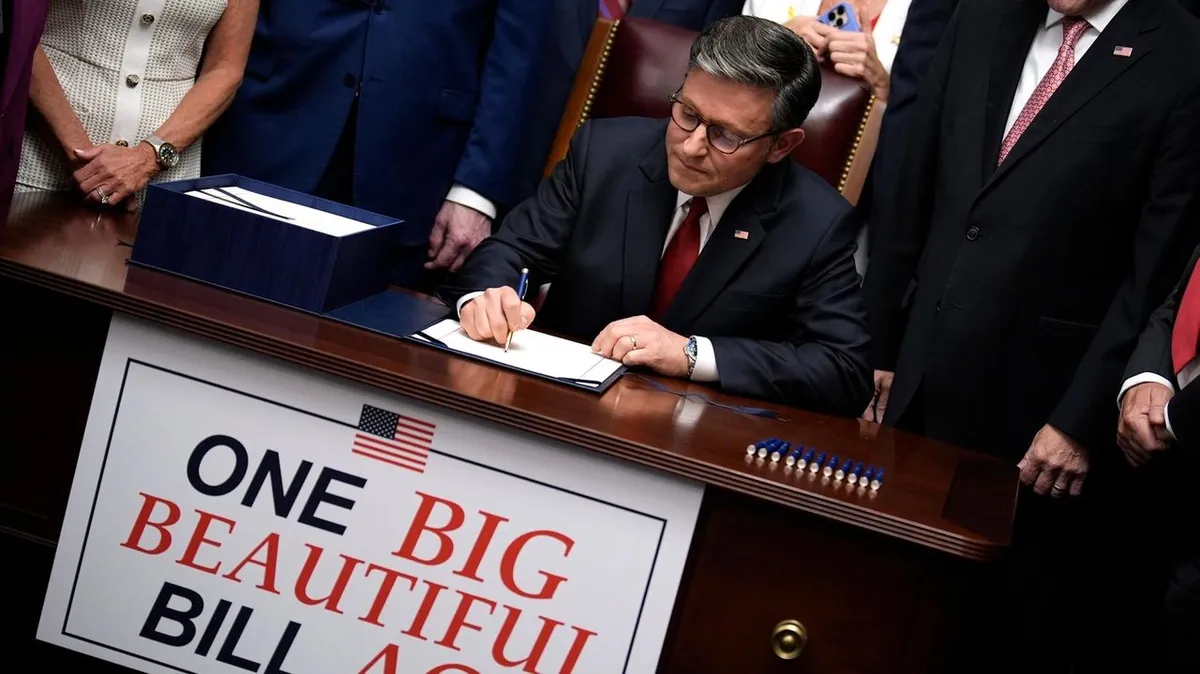
As President Donald Trump reaches the midpoint of his first year back in office, he has received the green light from a Republican-majority Congress to advance significant portions of his domestic agenda. This week, Congress passed a comprehensive budget bill that will have far-reaching implications for Long Island across various sectors, including the economy, environment, health care access, and immigration enforcement. Lawrence Levy, executive dean of Hofstra University’s National Center for Suburban Studies, noted that this legislation will play a crucial role in shaping the narrative leading up to next year’s midterm elections.
One of the central issues in the messaging battle on Long Island will revolve around the SALT (State and Local Tax) deduction. Levy pointed out the $10,000 cap on state and local tax deductions established by the Republican congressional majority in 2017 has been adjusted to $40,000 in the current bill. The outcome of this debate will hinge not only on media strategies and fundraising efforts but also on the economic climate and how residents perceive the effects of the SALT cap relative to other financial pressures in their lives.
Long Island’s congressional delegation voted strictly along party lines. Reps. Andrew Garbarino (R-Bayport) and Nick LaLota (R-Amityville) supported the bill, while Reps. Tom Suozzi (D-Glen Cove) and Laura Gillen (D-Rockville Centre) opposed it. Additionally, Democratic Senators Chuck Schumer and Kirsten Gillibrand also voted against the legislation.
The cornerstone of this megabill is the extension of the 2017 tax cuts that were initially set to expire soon. The current legislation aims to make most of these tax cuts permanent while introducing new temporary measures, such as the increase of the SALT cap to $40,000 for households earning $500,000 or less over the next five years. After this period, the cap is expected to revert to the original $10,000 limit.
Matt Cohen, president and CEO of the Long Island Association, praised Garbarino and LaLota for their successful negotiations to increase the SALT cap, despite resistance from some red-state Republicans. He emphasized that reinstating SALT deductions is a significant achievement for Long Islanders, stating, "This will impact many more taxpayers, jolt our economy, and make our region more affordable." However, Cohen also mentioned that the group is analyzing the bill's long-term effects on health care, renewable energy, food security, and the national deficit.
While the White House asserts that these tax cuts will stimulate domestic spending and encourage business growth, various economic studies predict that the package could increase the national debt by $3.4 trillion by 2034, potentially hindering long-term economic growth. A recent analysis from the Yale Budget Lab indicated that few provisions in the bill would actually foster sustainable economic growth, as they may instead exacerbate debt and spur rising interest rates.
Health care advocates warn that hundreds of thousands of New Yorkers could face loss of coverage due to alterations in Medicaid eligibility and changes to the Affordable Care Act enrollment criteria. An analysis by KFF, a nonprofit organization focused on health care policy, suggests that New York might lose $120 billion in federal Medicaid funding over the next decade. States that expanded Medicaid under the Affordable Care Act will now be expected to assume a greater share of Medicaid costs.
Recent state health data reveals that Suffolk County has 367,087 Medicaid enrollees, while Nassau County has 308,354. Kenneth E. Raske, president of the Greater New York Hospital Association, projected that around 1.5 million New Yorkers may lose health coverage due to the bill’s provisions. The nonpartisan Congressional Budget Office estimates that over 11.8 million Americans could lose access to health care by 2034. Raske stated, "Cutting health insurance eligibility doesn’t stop people from getting sick and ultimately going to the hospital, but it does skyrocket hospitals’ uncompensated care costs."
The budget bill also poses risks to environmental initiatives. Biden-era clean energy tax credits designed to promote the use of solar panels, wind energy, and electric vehicles are set to be phased out. Local environmental advocates express concern that this will hinder the growth of the clean energy sector on Long Island. For instance, a $7,500 tax credit for the purchase or lease of new electric vehicles will end on September 30, and a 30% tax credit for rooftop solar panels will be eliminated by year-end.
Adrienne Esposito, executive director of the Citizens Campaign for the Environment, noted that the loss of these credits would adversely affect middle- to low-income homeowners on Long Island who rely on tax breaks to manage their energy costs. "On Long Island, we have very high electric costs. The people using these tax breaks are doing so primarily for financial reasons, not just environmental ones," Esposito remarked.
Immigration enforcement has emerged as a pivotal issue for New York voters, particularly during the last presidential election. Trump's promise of a widespread deportation campaign will now receive a significant funding boost of $100 billion through 2029. This funding will expand the U.S. Immigration and Customs Enforcement (ICE) agency, making it the largest law enforcement agency in the country, with $45 billion earmarked for building detention facilities, $46 billion for border security, and $14 billion for deportations.
Levy indicated that this increase in immigration enforcement could help Republicans appeal to Trump's base in the upcoming midterm elections. However, it might also alienate moderate swing voters, as recent polls suggest many disapprove of ICE's implementation of Trump's immigration policies. "The way ICE has carried out its orders has turned off a lot of people, particularly political independents and moderates," Levy stated. The effectiveness of this messaging will be crucial as the parties prepare for the electoral battles ahead.